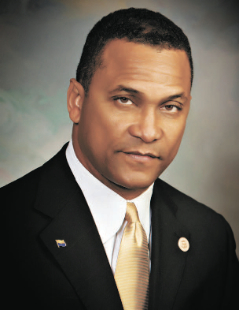 By Hazel Trice Edney
By Hazel Trice Edney
(TriceEdneyWire.com)
The chairman of the National Newspaper Publishers Association, a federation of more than 200 Black-owned newspapers, says the Washington Redskins’ team – under fire from a Richmond, Va. publisher – is in sync with the entire National Football League in its apparent oppressive treatment of Black businesses and consumers.
“It’s almost a slave mentality. They put us on the field and we entertain the master but we’re not reaping any benefits from the business side of it,” Campbell says. “It’s not just the Redskins. If you look around the country, the NFL as a whole pretty much neglects Black businesses and the Black community,” said Campbell, publisher of the Arizona Informant Newspaper.
He continued, “Here in Arizona, our Arizona Cardinals does zero with the Black community. Every now and then they might show up for a token Black event. But, I don’t see our African-American newspaper here in Phoenix or in Arizona being supported by the Arizona Cardinals. I believe if you called other newspapers that have [teams] in their markets, I don’t believe they’re doing much for them either. I believe the NFL as a whole takes the Black community for granted although we are their major product on the field.”
Campbell was responding to questions pertaining to a conflict between NNPA member Ray Boone, editor/publisher of the award-winning Richmond Free Press, and the Richmond-based Washington Redskins Training Camp, which is partially owned by Bon Secours Health System.
In a letter to NAACP Chairman Roslyn Brock and CC’d to Campbell, Boone states that the team contracted no business with Black-owned or locally owned businesses at its first Richmond training camp between July 25 and August 16. That includes the failure to advertise in the Black-owned Richmond Free Press while advertising with the white-owned conservative daily, the Richmond Times Dispatch which has a history of pro-segregation leadership. The conflict is steeped in an age-old battle constantly waged by Black newspapers, which are historic targets for advertising discrimination.
While Bon Secours placed paid advertisements for the training camp in the Times Dispatch, the Free Press was sent press releases, Boone said in an interview.
Brock, who has served as NAACP chair since 2010, is vice president for advocacy and government relations for the Bon Secours Health System, Inc., in Marriottsville, Md. Boone believes her corporate position has caused her to compromise her stance for economic justice in the Richmond case.
“Bon Secours, along with Mayor Dwight C. Jones and the Washington team, blatantly denied, contrary to the Mayor’s pledge, Black businesses and other local businesses the opportunity to receive vendor contracts inside the training camp,” Boone wrote in a Sept. 27 letter to Brock. “Characteristic of Richmond government and big businesses, this Bon Secours decision disgracefully enhanced Richmond’s shameful reputation as ‘The Capital of Poverty,’ with 25 percent of Richmond’s population suffering in poverty.”
When Brock had not responded to his letter for more than a month, Boone followed up with a Nov. 1 email pointing out, “This raises the unavoidable question of whether Bon Secours is restricting you from living up to your responsibility to honor the NAACP mission?”
He continued, “In the interest of fairness and the image of the NAACP, I respectfully suggest that you break your silence.”
Brock responded to Boone by email that same day, stating, “The matter you reference in your letter is local in nature and should be handled directly by the Richmond Branch NAACP and Salim Khalfani at the Virginia State Conference NAACP. I have forwarded your correspondence to them and shared the information with the leadership of Bon Secours Health System in Richmond.”
In an email, responding to a question from the Trice Edney News Wire this week, Brock said that she had not publically commented on Boone’s complaint because it is a local issue.
Brock’s email said she had “also discussed the matter in detail with” Campbell, who is serving his second term as NNPA chairman. At a Sept. 17 reception in D.C., Campbell, Boone and other NNPA publishers praised Brock for her leadership and gave her an award for social justice.
While Campbell verbally blistered the NFL, including the Redskins, he balanced his response by saying he agrees with Brock that the issue in Boone’s case is local since the economic decisions appear to have been made by the mayor and Bon Secours’ Richmond entities.
“At the end of the day, I think [the criticism of her] is unfair just because she works for Bon Secours. That’s her day job. We all volunteer at some time with the NAACP,” Campbell says, referring to Brock’s volunteer chairmanship. “While we want to see Mr. Boone and his publication get what it deserves and more so; that is definitely a local issue.”
Boone, who recently announced he has stopped using the term “Redskins” in the Richmond Free Press because it is “racist”, argues that the Redskins’ and Bon Secours’ exclusion of Black businesses underscores and illustrates the team’s mentality under the controversial name, which is receiving growing national pressure for change.
In her email to the Trice Edney News Wire, Brock also clarified that the NAACP has long stood against the Redskins name because of its roots in racism. “The NAACP passed a resolution more than 10 years ago against racial slurs being used as mascots. In the last few months the NAACP signed on letters with the Oneida Tribe, based in Washington and the National Coalition on American Tribes especially in support of their efforts to change the Redskins name,” she wrote.
Neither Mayor Dwight C. Jones; nor Virginia NAACP President King Salim Khalfani could be reached for comment by deadline. Bon Secours representatives did not return repeated phone calls.
Meanwhile, Boone, a recipient of the State NAACP’s Oliver W. Hill Freedom Fighter Award, remains focused on his quest for economic justice, promising Brock “fairness and balance” in upcoming coverage of her leadership positions with the NAACP and Bon Secours.
Such economic battles have been hard fought in Richmond and in Black and grassroots communities across the nation. Former Richmond City Councilman Chuck Richardson, known for his historic advocacy for Black businesses and contractors, recalls researching Washington Redskins’ racism as far back as 1961. That’s when he wrote a research paper in junior high school about the team and how the Redskins was “the last professional football team to allow Blacks to play for them,” he said in an interview. “This harkens back to that painful time. It hurt then and I would have thought that a greater degree of change might have occurred, but the mentality still exists. It seems so much has changed and yet so much remains the same.”



